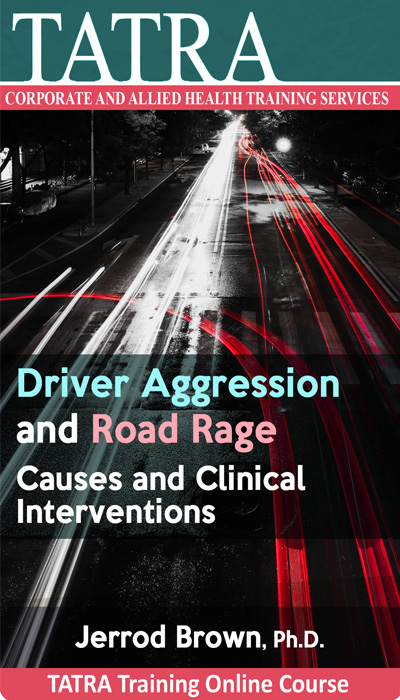01 Jun Driver Aggression and Road Rage: Causes and Clinical Interventions

We’ve all been cut off in traffic or caught behind a slow driver at the wrong time. Why do we feel “rage” when this happens? How can we help ourselves and our clients manage driving rage or aggression? As more people take the to the roadways post-pandemic, streets become more crowded, and societal stressors mount, we are seeing more instances of road rage and driver aggression hit the news, many of these interactions fatal or catastrophic. Finally, a CE training to highlight the phenomenon!
Aggressive driving and road rage are concerning behaviors that have significant societal implications. Intended for professionals, this training will examine the causes, triggering events, consequences, and common forms of aggressive driving behaviors and road rage. A section of this training will also examine screening and intervention options appropriate for persons who engage in these behaviors. Other topics discussed in this training will include alexithymia, anger management problems, attachment patterns, conflict resolution problems, emotional intelligence, empathy, executive dysfunction, fatigue, hostility, impatience, impulse control issues, irritability, lower emotionality, mentalization, metacognition, mindful attention, paranoia, personality disorders, perspective taking, psychological distress, rumination, self-efficacy, self-regulation deficits, sensation-seeking, sleep disturbances, and substance misuse to name a few. Empirically-based research findings and case study examples will be highlighted throughout this training.


This training will provide participants clinical knowledge and tools to:
a). Demonstrate understanding of the neurobiopsychosocial factors and personality traits that contribute to aggressive driving behaviors and road rage.
b). State environmental factors that might trigger aggressive driving behaviors and road rage.
c). Define related terms, such as problematic driving behaviors, driver aggression, risky driving behaviors, and driver-related stress.
d). Learn and understand the consequences associated with aggressive driving behaviors and road rage.
e). Describe the victim-offender profiles and interactional patterns typical of road rage and driver aggression.
f). Learn and practice screening and intervention approaches.
g). Learn and understand empirically-based research findings pertaining to these topics.
Target Audience:
Mental Health Clinicians, Social Workers, Psychologists, Marriage & Family Therapists, Counselors, School Personnel, Youth Development Workers, and Healthcare Workers.


This online workshop will give you instant access to 1 session of video content, accessible via streaming on our website, as well as downloadable PowerPoint slides. You can view the course content in your own time, there is no time limit on access.
The duration of this workshop is 2 learning hours.
Please click the green ‘Mark Complete’ button on each module as you progress. A certificate of completion will be generated upon finishing the course and completing a short assessment quiz. If the certificate is not showing, please confirm you have marked all sections as ‘Complete’. Please consult your professional organisation/association to confirm whether you are able to claim any CPD points/hours for this online workshop.



 Jerrod Brown, PhD, MA, MS, MS, MS
Jerrod Brown, PhD, MA, MS, MS, MS